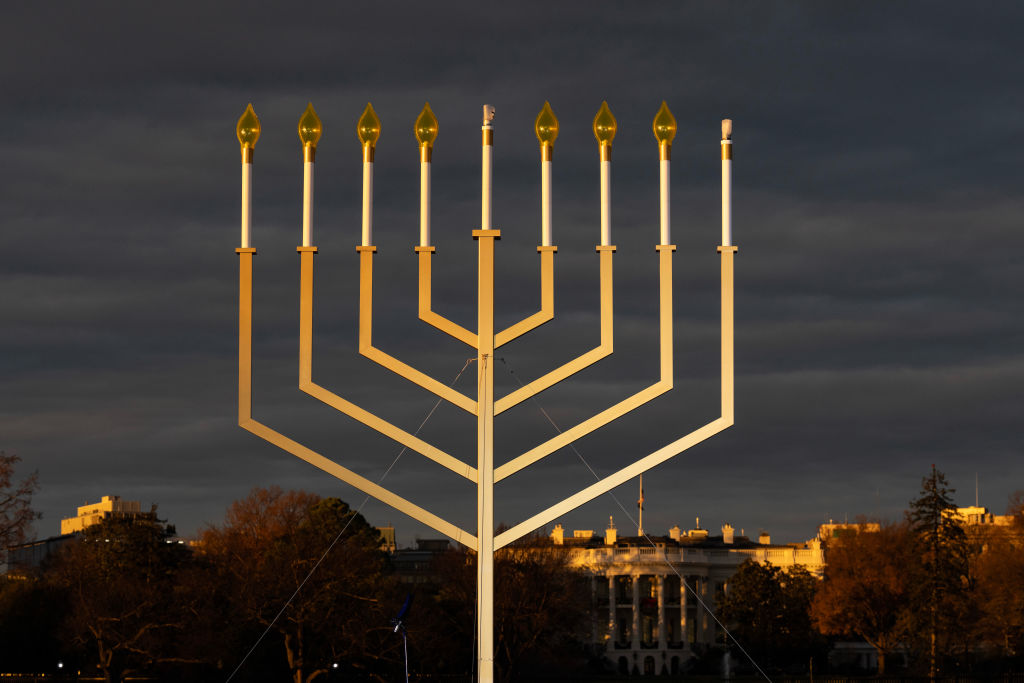
If you have heard about Hanukkah, you’ve probably heard about the story of the miracle of light. There was only enough oil to light the Temple in Jerusalem for one night, but it lasted for eight. That’s the Hanukkah miracle.
I like this story and I like its message, particularly for children. The message is about hope, possibility, community, and belief. It is aspirational, positive, and universal. But this year, Hanukkah feels different. Jewish Americans are outraged and devastated by the bold-faced antisemitism that feels like it’s all around us. While taking our children home from school, we hear open calls for our deaths on the street. In our professional lives, we watch in horror as organizations dedicated to the protection of women stay silent for far too long when it comes to violence against Jewish women. In our religious lives, we evacuate our synagogues because of yet another bomb threat.
So this year, because the world is different for us, we need to celebrate Hanukkah a little differently, too. Rather than emphasize the universal aspects of Hanukkah, the simple, almost quaint teachings of the miracle of the oil, we need to celebrate the Festival of Lights for what it is—a specific story about the perseverance of a particular people facing antisemitic persecution.
Read More: All the Ways We Deny Antisemitism
The story of the miracle of light is recounted in the Talmud. But the more historic recounting of the Hanukkah story is told in the Book of Maccabees. The short version of the story is this: Antiochus IV Epiphanes, the Seleucid leader of the Syrian kingdom, came to power and ruled the Land of Israel. Antiochus was a Hellenist and he required obedience to that way of life. As Jews posed a perceived threat to this ideology, Antiochus banned Judaism: no more Hebrew, no more Jewish holidays, and worst of all, no more Torah. Some Jews happily walked through the doors of assimilation into Antiochus’ Hellenistic ways. After all, Greek philosophy, literature, math, and science were waiting on the other side.
But some Jews stubbornly refused to assimilate and continued the sometimes strange and stiff-necked traditions of our people. Antiochus and his army destroyed our sacred Temple in Jerusalem, installed a statue of Zeus on the bima, and sacrificed pigs on our holy altar—a gruesome, hateful act designed to humiliate and deflate the Jewish people. But a small group of Jews, that we now call the Maccabees, persevered. They revolted against the great Syrian army and won back sovereignty, as well as the right to keep Jewish tradition alive. This story—of determination, dedication, and survival—is also what we are celebrating on Hanukkah.
Hanukkah is a holiday about being particularly, proudly, even defiantly, Jewish. Instead of emphasizing the “sameness” of our holiday, this is the year, we ask that others celebrate our diversity.
Can America embrace this version of the Jewish people? Can we celebrate a Jewish people who will not relinquish our customs, our culture, our community, or our voice? Can we tolerate, and even extol, a Jewish people who choose to foreground our Jewish identity? Can we praise the Jewish people for having the audacity to claim our identity in cultural and academic settings that ask us to diminish it?
Hanukkah reminds us Jews will not sit silently on the sidelines while hate crimes and hate speech against us skyrocket. Rather, we will tell our stories, teach our history, mourn our traumas, and celebrate our very existence. We will sing our songs, eat our food, and speak our languages. We will fight for justice for people of all backgrounds, and we will expect the same in return. We will try to repair a broken world. We will continue to be a people. We will pray together, rejoice together, cry together, and laugh together. And we will celebrate this holiday of Hanukkah with joy, pride, and particularity.
For me, even in the face of this current grotesque antisemitism, I see a cadre of surprising if unlikely allies forming around the Jewish people to do just that. Since the attacks of October 7th, I regularly receive letters and notes of support from my Christian counterparts, specifically from Catholic leaders. I’ve seen cowboys from Montana showing up to pick fruit in Israel. I’ve heard from diasporic Armenians who have also been through a genocide and know what it means to live in diaspora. I’ve witnessed support from Persians who fled the regime, coming together to support the Jewish people. And I see Jews, who once felt distant from Judaism coming home, suddenly seeking connection with their people.
Most of all, I just see good people who are eager to preserve the safety and security of Jews in America. It’s a community that places human decency above politics, and who offer compassion even when there are differences. For me, this is the hope that Hanukkah brings this year: the possibility that Jews can be embraced in this country not as ambassadors of universal values, but as a living remnant of a particular people with a history of survival and strength in the face of opposition.
More From TIME
More Must-Reads From TIME
- What Student Photojournalists Saw at the Campus Protests
- How Far Trump Would Go
- Why Maternity Care Is Underpaid
- Saving Seconds Is Better Than Hours
- Welcome to the Golden Age of Ryan Gosling
- Scientists Are Finding Out Just How Toxic Your Stuff Is
- The 100 Most Influential People of 2024
- Want Weekly Recs on What to Watch, Read, and More? Sign Up for Worth Your Time
Contact us at letters@time.com